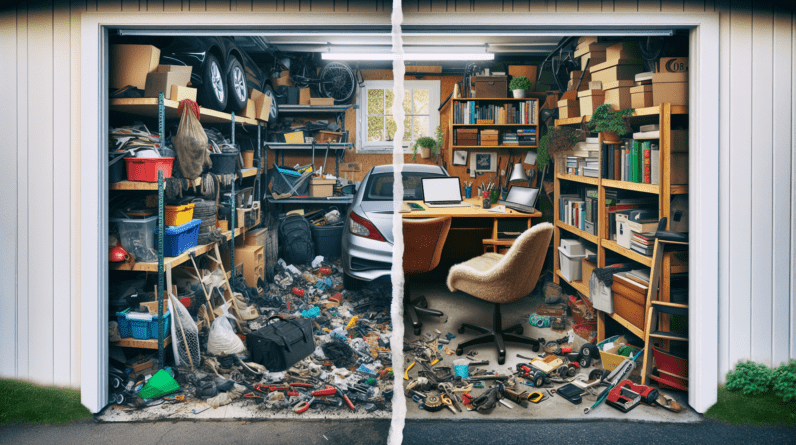
You’ve finally decided to convert your garage into a more functional space, whether it’s a home office, a gym, or even an extra bedroom. But before you start dreaming about your exciting new renovation project, it’s important to consider the necessary permits. Understanding the permits required for converting your garage will not only ensure compliance with local regulations, but also give you peace of mind. From my research, it is crucial to obtain the appropriate permits from your local government authorities to ensure a smooth and hassle-free transformation. These permits typically involve aspects such as electrical work, plumbing, zoning regulations, and structural modifications. By following the correct permit procedures, you can confidently proceed with your garage conversion knowing that you are adhering to legal requirements.

Types of Permits
If you’re considering converting your garage into a living space, it’s important to familiarize yourself with the various permits that may be required for the project. Converting a garage involves significant changes to the structure, electrical, plumbing, and mechanical systems, which necessitates obtaining the necessary approvals from local authorities. Here are the most common types of permits you may need to convert your garage:
Building Permit
Definition
A building permit is a legal document issued by the local government agency that allows you to proceed with construction or remodeling projects. It ensures that your project meets the minimum safety standards and complies with local building codes.
Purpose
The purpose of a building permit is to protect public health, safety, and welfare. It ensures that your garage conversion project meets structural, electrical, plumbing, and mechanical requirements, safeguarding both the occupants and neighboring properties.
Requirements
To obtain a building permit for your garage conversion, you will typically need to submit detailed plans and specifications of the proposed modifications. These plans should outline the structural changes, electrical wiring, plumbing alterations, and mechanical system updates.
Application Process
The application process for a building permit usually involves filling out an application form and submitting the required documents to the local building department. Once the application is submitted, it goes through a review process, during which the plans are evaluated for compliance with the building codes.
Cost
The cost of a building permit varies depending on the scope and value of the construction project. The fee is typically based on a percentage of the total construction cost. According to my research, the average cost of a building permit for a garage conversion ranges from $200 to $1,500.
Issuing Authority
The issuing authority for building permits varies depending on your location. It is usually the local building department or permitting office responsible for overseeing construction activities within the jurisdiction.
Zoning Permit
Definition
A zoning permit, also known as a land use permit, is a document issued by the local zoning authority that grants permission for a specific land use or development. It ensures that your proposed garage conversion complies with the zoning regulations in your area.
Purpose
The purpose of a zoning permit is to regulate land use and ensure that the proposed changes align with the designated zoning district. It prevents inappropriate land use and protects the character and integrity of the surrounding neighborhood.
Requirements
To obtain a zoning permit for your garage conversion, you will need to verify that your property is zoned for residential use and that converting your garage into a living space is allowed within that zone. You may also need to satisfy requirements such as setback limitations, lot coverage, and parking provisions.
Application Process
The application process for a zoning permit involves submitting an application form, along with the necessary supporting documents, to the local zoning office. These documents typically include site plans, floor plans, and a description of the proposed garage conversion.
Cost
The cost of a zoning permit for a garage conversion varies depending on your location. It can range from a nominal fee to a few hundred dollars. It is important to check with your local zoning office for the exact cost associated with obtaining a zoning permit.
Issuing Authority
The issuing authority for zoning permits is typically the local zoning or planning department. They are responsible for ensuring that your project complies with the zoning regulations and guidelines set forth by the local government.
Electrical Permit
Definition
An electrical permit is a document that authorizes electrical work to be performed, ensuring that it is conducted safely and in compliance with the applicable electrical codes and regulations.
Purpose
The purpose of an electrical permit is to safeguard against electrical hazards and ensure that the electrical systems in your garage conversion meet the required standards. It also allows for proper inspection and certification of the electrical work.
Requirements
To obtain an electrical permit for your garage conversion, you will need to provide detailed information about the planned electrical modifications, including the type and size of wiring, outlets, switches, and fixtures. This information allows the electrical inspector to assess the safety and compliance of the proposed electrical work.
Application Process
The application process for an electrical permit typically involves submitting an application form to the local electrical permitting office, along with the necessary plans and specifications. These plans should clearly outline the proposed electrical layout and components.
Cost
The cost of an electrical permit varies depending on the scope of the electrical work involved in your garage conversion. This fee is typically based on the number of electrical fixtures, circuits, and systems being installed or modified. According to our data, the average cost of an electrical permit for a garage conversion ranges from $100 to $500.
Issuing Authority
The issuing authority for electrical permits is usually the local electrical permitting office or the building department responsible for inspecting and approving electrical work within the jurisdiction.

Plumbing Permit
Definition
A plumbing permit is a document that grants permission for plumbing work to be conducted on your property. It ensures that the plumbing modifications made during your garage conversion meet the requirements of the plumbing code and regulations.
Purpose
The purpose of a plumbing permit is to protect public health and safety by ensuring that the plumbing systems in your garage conversion meet the necessary standards. It also allows for proper inspection and certification of the plumbing work.
Requirements
To obtain a plumbing permit for your garage conversion, you will need to provide detailed information about the proposed plumbing modifications. This typically includes the location and type of plumbing fixtures, pipes, drains, and venting systems.
Application Process
The application process for a plumbing permit involves submitting an application form and the necessary plans and specifications to the local plumbing permitting office. These plans should clearly outline the proposed plumbing layout and components.
Cost
The cost of a plumbing permit for a garage conversion varies depending on the extent of the plumbing work involved. The fee is typically assessed based on the number of plumbing fixtures, pipes, and systems being installed or modified. It’s important to note that the cost of the permit is separate from the cost of hiring a licensed plumber to perform the work. You can expect the average cost of a plumbing permit for a garage conversion to range from $100 to $500.
Issuing Authority
The issuing authority for plumbing permits is typically the local plumbing permitting office or the building department responsible for inspecting and approving plumbing work within the jurisdiction.
Mechanical Permit
Definition
A mechanical permit is a document that authorizes the installation, modification, or replacement of mechanical systems, such as heating, ventilation, and air conditioning (HVAC) systems. It ensures that the mechanical work in your garage conversion meets the requirements of the mechanical code and regulations.
Purpose
The purpose of a mechanical permit is to ensure that the mechanical systems in your garage conversion are safe, efficient, and meet the necessary standards. It also allows for proper inspection and certification of the mechanical work.
Requirements
To obtain a mechanical permit for your garage conversion, you will need to provide detailed information about the proposed mechanical modifications. This typically includes specifications for the HVAC system, ductwork, ventilation, and any other mechanical components.
Application Process
The application process for a mechanical permit involves submitting an application form, along with the necessary plans and specifications, to the local building or mechanical permitting office. These plans should clearly outline the proposed mechanical layout and components.
Cost
The cost of a mechanical permit for a garage conversion varies depending on the complexity of the mechanical work involved. The fee is generally based on the size and type of the mechanical systems being installed or modified. From my experience, the average cost of a mechanical permit for a garage conversion ranges from $100 to $500.
Issuing Authority
The issuing authority for mechanical permits is typically the local building or mechanical permitting office responsible for inspecting and approving mechanical work within the jurisdiction.
Garage Conversion Regulations
Aside from obtaining the necessary permits, there are additional regulations and standards that you should consider when converting your garage into a living space. These regulations ensure that your garage conversion is safe, habitable, and meets the requirements set forth by local building codes. Here are some key areas to consider:
Local Building Codes
Local building codes govern the construction and remodeling of structures within a specific jurisdiction. They outline the minimum requirements for things like structural integrity, electrical wiring, plumbing systems, and mechanical equipment. According to my research, the specific requirements for garage conversions can vary widely depending on your location, so it’s essential to consult your local building codes and permitting office for guidance.
Fire Safety Standards
Fire safety is of utmost importance when converting a garage into a living space. You must comply with fire safety standards to protect the occupants and the surrounding properties. Some common fire safety requirements for garage conversions include:
Smoke Detectors
Installing smoke detectors throughout the converted area and ensuring they are interconnected and properly functioning.
Fire Extinguishers
Having fire extinguishers readily accessible in strategic locations within the converted space.
Escape Routes
Providing safe and easily accessible escape routes in case of a fire or emergency. This may involve installing additional doors or windows, ensuring unobstructed paths, and implementing proper signage.
Parking Requirements
Converting your garage into a living space may impact your property’s parking capacity. Many local jurisdictions have parking requirements that dictate the minimum number of parking spaces needed for residential properties. It’s essential to consider these requirements and ensure that your property complies with the designated parking ratios.
Accessibility Guidelines
If you plan to use the converted space for habitation, it’s crucial to adhere to accessibility guidelines to accommodate individuals with disabilities. This may involve providing wheelchair-accessible entrances, doorways, and facilities, as well as ensuring proper maneuverability throughout the converted area.
Energy Efficiency Standards
Converting your garage into a living space offers an opportunity to enhance the energy efficiency of your home. You may be required to meet certain energy efficiency standards as outlined by your local building codes. Here are a few key areas to consider:
Insulation Requirements
Adding or upgrading insulation in the walls, ceiling, and floor to improve thermal performance and energy efficiency.
Window Efficiency
Installing energy-efficient windows that are properly sealed and insulated to reduce heat gain or loss.
HVAC System
Ensuring that the heating, ventilation, and air conditioning systems in the converted space meet energy efficiency standards, such as proper sizing, high-efficiency equipment, and adequate insulation.
In conclusion, converting your garage into a living space requires careful consideration of the various permits and regulations involved. It is essential to familiarize yourself with the specific requirements outlined by your local building codes, as well as the issuing authorities responsible for approving and inspecting the work. By obtaining the necessary permits and complying with the applicable regulations, you can ensure a safe and legally compliant garage conversion that adds value and functionality to your home.






